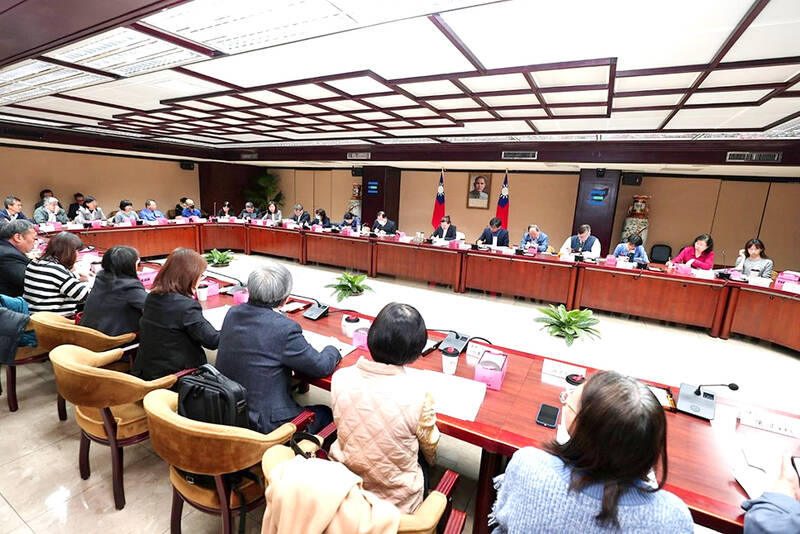The government plans to help boost the local small-molecule drug CDMO industry by cooperating with firms to jointly develop key technology platforms, the Ministry of Economic Affairs (MOEA) said yesterday.
CDMO refers to a contract development and manufacturing organization, which provides essential services to both pharmaceutical and biotech companies with lower-cost, time-saving drug research, manufacturing and testing processes.
The key technology platforms, which would have a high entry threshold, include active pharmaceutical ingredient (API) intermediates, continuous manufacturing processes as well as special delivery solutions and dosage forms for small molecules, the ministry said in a statement.

Photo courtesy of Ministry of Economic Affairs
The ministry said it would also assist firms in conducting carbon emission investigations, enhance their engagement in international markets and simplify administrative procedures to facilitate global CDMO business opportunities.
The ministry’s remarks came after it held a meeting on Wednesday with representatives from domestic API makers, pharmaceutical formulation providers and
medical associations, as well as several health and welfare officials and researchers to discuss how to promote Taiwan’s small molecule CDMO industry.
Small molecule drugs are synthesized organic compounds with low molecular weights that allow them to penetrate cells easily and target important proteins.
The production value of small molecule drugs accounts for about 70 percent of Taiwan’s total pharmaceutical output of NT$108.9 billion (US$3.5 billion), making it a key part of the nation’s pharmaceutical industry, the ministry said.
However, many local small molecule drug manufacturers are less focused on advanced technology and lack connections with international markets, the ministry said, adding that it aims to help fims upgrade and build international links.
Rising demand for small molecule drugs is expected to create business opportunities for CDMOs. A Future Market Insights report issued in November last year said that the global small molecule CDMO market is projected to be valued at about US$124.53 billion in 2034, as the market is estimated to grow at a compound annual growth rate of 5.24 percent over the next 10 years.

UNCERTAINTY: Innolux activated a stringent supply chain management mechanism, as it did during the COVID-19 pandemic, to ensure optimal inventory levels for customers Flat-panel display makers AUO Corp (友達) and Innolux Corp (群創) yesterday said that about 12 to 20 percent of their display business is at risk of potential US tariffs and that they would relocate production or shipment destinations to mitigate the levies’ effects. US tariffs would have a direct impact of US$200 million on AUO’s revenue, company chairman Paul Peng (彭雙浪) told reporters on the sidelines of the Touch Taiwan trade show in Taipei yesterday. That would make up about 12 percent of the company’s overall revenue. To cope with the tariff uncertainty, AUO plans to allocate its production to manufacturing facilities in

Taiwan will prioritize the development of silicon photonics by taking advantage of its strength in the semiconductor industry to build another shield to protect the local economy, National Development Council (NDC) Minister Paul Liu (劉鏡清) said yesterday. Speaking at a meeting of the legislature’s Economics Committee, Liu said Taiwan already has the artificial intelligence (AI) industry as a shield, after the semiconductor industry, to safeguard the country, and is looking at new unique fields to build more economic shields. While Taiwan will further strengthen its existing shields, over the longer term, the country is determined to focus on such potential segments as

TAKING STOCK: A Taiwanese cookware firm in Vietnam urged customers to assess inventory or place orders early so shipments can reach the US while tariffs are paused Taiwanese businesses in Vietnam are exploring alternatives after the White House imposed a 46 percent import duty on Vietnamese goods, following US President Donald Trump’s announcement of “reciprocal” tariffs on the US’ trading partners. Lo Shih-liang (羅世良), chairman of Brico Industry Co (裕茂工業), a Taiwanese company that manufactures cast iron cookware and stove components in Vietnam, said that more than 40 percent of his business was tied to the US market, describing the constant US policy shifts as an emotional roller coaster. “I work during the day and stay up all night watching the news. I’ve been following US news until 3am

COLLABORATION: Given Taiwan’s key position in global supply chains, the US firm is discussing strategies with local partners and clients to deal with global uncertainties Advanced Micro Devices Inc (AMD) yesterday said it is meeting with local ecosystem partners, including Taiwan Semiconductor Manufacturing Co (TSMC, 台積電), to discuss strategies, including long-term manufacturing, to navigate uncertainties such as US tariffs, as Taiwan occupies an important position in global supply chains. AMD chief executive officer Lisa Su (蘇姿丰) told reporters that Taiwan is an important part of the chip designer’s ecosystem and she is discussing with partners and customers in Taiwan to forge strong collaborations on different areas during this critical period. AMD has just become the first artificial-intelligence (AI) server chip customer of TSMC to utilize its advanced